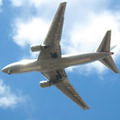 美國地質調查局針對除去或防止飛機產生危險結冰現象的化學藥劑進行監測,以了解其對於水生生物的相對毒性。 調查局研究人員說,在比較9種不同配方後發現,並不是用於除去或防止結冰的基本化學物質具有毒性,其毒性是由製造商所添加的特殊化學物質所造成。
美國地質調查局針對除去或防止飛機產生危險結冰現象的化學藥劑進行監測,以了解其對於水生生物的相對毒性。 調查局研究人員說,在比較9種不同配方後發現,並不是用於除去或防止結冰的基本化學物質具有毒性,其毒性是由製造商所添加的特殊化學物質所造成。
而且在這些配方中,造成毒性的不是乙二醇和丙二醇這些主要的成份,或是已知的添加物。在去冰劑或抗冰劑中添加的藥劑,使這些產品使用起來更便利,確保它們能夠黏附在機翼及機身上,增加效果。這些專利成分只有製造商才知道。
研究結果顯示,抗冰劑比去冰劑毒性更高的原因是,因為抗冰劑具有較高比例的添加物。有些添加物格外令人擔憂,不僅因為其本身的毒性,還有它們在環境中分解時,毒性會更加嚴重。
在這項結合密爾瓦基國際機場、達拉斯/華茲堡國際機場所完成的研究,直接在儲存槽及去冰中的飛機上取得配方樣本,並以鯉魚、水蚤、綠藻及海洋細菌做測試。測試生物對於不同的產品配方感應度不同。在報告的結果中,相同濃度的去冰劑和抗冰劑分子的毒性程度,有時高於以往在機場排放物觀察到的化合物。
美國環保署承認飛機的去冰劑和抗冰劑會對環境造成衝擊,目前正研究可行的指導原則,考慮以全國性法規限制化學藥劑由機場流出。
The U.S. Geological Survey, USGS, has been examining the relative toxicity to aquatic life from chemicals used to remove or prevent dangerous ice buildup on aircraft.
Not the basic chemicals for ice removal or prevention, but proprietary chemicals added by manufacturers are responsible for the toxicity they observed, agency researchers said after comparing nine different formulations.
Neither of the primary ingredients - ethylene glycol and propylene glycol - nor the known additives accounted for all observed toxicity of these formulations. Additives are used in de-icers and anti-icers to facilitate product application, ensure that the product will adhere to aircraft wings and fuselage, and enhance its overall effectiveness. Those that are proprietary have compositions known only to the manufacturers.
Study results indicated that anti-icers are more toxic than de-icers due to the larger percent of additives contained in anti-icers. Some additives are of special concern not only due to the toxicity of the additive, but because they can become increasingly toxic as they degrade in the environment.
For this study, completed in cooperation with Milwaukee's General Mitchell International Airport and the Dallas-Fort Worth Airport, formulations were collected directly from storage tanks and de-icing vehicles and tested on minnows, water fleas, green alga, and marine bacterium. The sensitivity of tested organisms varied according to formulation of the product. Concentrations of deicer and anti-icer components previously observed in airport effluents have, at times, exceeded the toxicity levels shown in results of this study.
The U.S. EPA acknowledges that there is environmental impact from aircraft de-icers and anti-icers and is studying possible guidelines in consideration of national regulation to limit its runoff from airports.



